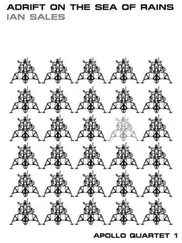Юджин Фишер - Adrift
Здесь есть возможность читать онлайн «Юджин Фишер - Adrift» весь текст электронной книги совершенно бесплатно (целиком полную версию без сокращений). В некоторых случаях можно слушать аудио, скачать через торрент в формате fb2 и присутствует краткое содержание. Год выпуска: 2010, Жанр: Фантастика и фэнтези, short_story, на английском языке. Описание произведения, (предисловие) а так же отзывы посетителей доступны на портале библиотеки ЛибКат.
- Название:Adrift
- Автор:
- Жанр:
- Год:2010
- ISBN:нет данных
- Рейтинг книги:3 / 5. Голосов: 1
-
Избранное:Добавить в избранное
- Отзывы:
-
Ваша оценка:
- 60
- 1
- 2
- 3
- 4
- 5
Adrift: краткое содержание, описание и аннотация
Предлагаем к чтению аннотацию, описание, краткое содержание или предисловие (зависит от того, что написал сам автор книги «Adrift»). Если вы не нашли необходимую информацию о книге — напишите в комментариях, мы постараемся отыскать её.
Adrift — читать онлайн бесплатно полную книгу (весь текст) целиком
Ниже представлен текст книги, разбитый по страницам. Система сохранения места последней прочитанной страницы, позволяет с удобством читать онлайн бесплатно книгу «Adrift», без необходимости каждый раз заново искать на чём Вы остановились. Поставьте закладку, и сможете в любой момент перейти на страницу, на которой закончили чтение.
Интервал:
Закладка:
Eugene Fischer
Adrift
Eugene Fischer is a twenty-six-year-old author who grew up in San Antonio, Texas, and still makes his home there. Though his work has previously appeared online at Strange Horizons, this is his first print publication. The author tells us he clearly remembers “being eleven years old and spending an entire afternoon with the first short fiction periodical I ever read — the June 1995 issue of Asimov’s with James Patrick Kelly’s ‘Think Like a Dinosaur’ in it. Thirteen years later I attended the 2008 Clarion Science Fiction and Fantasy Writers’ Workshop, where Jim was one of my instructors.” Eugene began writing “Adrift” with the concept of a technology to obviate ports, but no story to tell until he found out about the deplorable situation in the Democratic Republic of the Congo. Knowledge of the conditions in the DRC has led to his support for Women for Women International, www.womenforwomen. org, whose mandate is to help women victimized by warfare.
It wasn’t until they were underway that the fear truly hit his sisters — the fear of dying lost and in the dark. “It doesn’t have to be dark,” he told them, and dug through his bag of equipment. He spoke with the confidence of one in possession of freshly researched knowledge. “And there is no getting lost. Once we are out on the water, nothing can go wrong. When we get far enough from shore it is certain we will reach our destination.”
The first of the two new emails in Janet Candle’s inbox was from meteorology, informing her that tropical storm Harvey, supposed to be heading toward the Caribbean, had unexpectedly turned south. All of the distance vectors for cells servicing Venezuela, Guyana, and Surinam were going to have to be changed.
The second email was from Caxton. He’d experimentally emailed Janet at her work address a week ago, and when, out of habit, she answered it immediately, he started sending each of his carefully measured appeals to both of her accounts. This one was filled with the details of his yesterday and a reminder that, it being the weekend, he’d be available when she got off shift if she wanted to talk. The close read, “Lots of love, always, C.”
Their marriage was ending. Maybe it was already over. That was the point of applying for the position on Platform Beryl in the first place, wasn’t it? To put distance between them. When they were together he came home after spending his days teaching other people’s children and would have nothing for her but disappointment and frustration. At the time she had been certain that by leaving she was giving him what he wanted. But that was not how he responded. Upon learning that she had conceived of and acted on plans for their separation, his aspect transitioned almost instantly from indifference to voluble commitment. Now that their lives were seven hours out of sync, that commitment took the form of these emails. Exasperated, Janet resolved to wait until her shift was up to reply that she was too exhausted to chat.
Her phone rang. Janet answered it to hear the French-accented voice of the platform’s lead technician on the other end.
“Ms. Candle? This is Henri. Could we please have the pleasure of your presence down on the maintenance deck?”
“Why? What’s up, Henri?”
“A node was just brought in for service with human passengers.”
Janet pushed back in her chair, turned away from her screen, put the email from her husband out of her mind. “What do you mean ‘passengers’? Were they riding it?”
“It came in with a shipping container still loaded. Examination revealed that the container was breached, so we opened it to transfer the contents to a seaworthy one. Inside we found three people.”
“Alive? Where are they now?”
“I put them in the break room and told them our administrator would come to speak with them soon. They speak French, but there is one who says he speaks English as well.”
“Okay. Keep them there. I’m coming down.”
The idea of putting oneself into a shipping container with a watertight, and therefore airtight, seal for the length of time it would take to get anywhere was insane. The idea of heading out onto the ocean in a container that was not watertight was only slightly less so. Janet left her office and headed out into the metal corridors and down three levels to the maintenance deck at the bottom of the platform, where Henri’s team had already winched up the malfunctioning node. It hung above the intake bay, water still dripping from its screws. Next to the intake bay Henri stood beside a half-unloaded shipping container. Janet navigated around the stacks of white plastic tubs that the jumpsuited roustabouts were removing from it and made her way over to him. He was poking at a handheld.
“I can’t associate with the container at all,” he told her. “RFID’s intact, but there is no wireless signal. I’m going to have to see if I can get routing data from the node.” He dropped his handheld into a pocket of his coverall. “Come look at this,” he said, and led her up the short flight of stairs that had been wheeled up against the container.
Evenly spaced along the length of the container’s top were three holes, each easily an inch in diameter.
“It was the first thing that jumped out at me when it came into the bay,” said Henri. “Never seen anything like it before. They drilled right through the casing.”
“Air holes,” said Janet.
“So I discovered when I found our visitors hiding inside.”
“Is there anything more you can tell me about them?”
“No, no. The man, he asked questions, but I decided that this was outside of my purview. I told them you would come talk with them.”
“Take me to them,” said Janet.
Henri led her to the break room, where a young man and two younger girls waited. Their clothing was disheveled and sweat stained, and they smelled like people who had been living in a box for an indeterminate amount of time. They sat around the table with cloth sacks at their feet and cans of soda from the break room fridge in their hands, looking very nervous.
“I’m Janet Candle, the administrator of this facility,” Janet said, sizing up her stowaways. “Let’s start with who you are and where you came from.”
The two girls looked at each other, and at the young man, who said something to them in a language Janet didn’t know, and then stood to address her.
“Hello to you, Administrator Candle. I am Laurent Mokina, and these are my sisters, Therese and Nagaila. We are come here from the Democratic Republic of the Congo, and it is our wish to ask for political asylum in this country.”
The way he said it made it sound to Janet like a rehearsed speech. He stood under the fluorescent lights with glistening skin, his bravery like a fresh coat of paint. How old was he? Twenty-five? Younger?
“I’m afraid that will be impossible,” said Janet, “because you are not in a country at present.”
It took a moment for the meaning of her words to parse, and when they did Janet could see in the young man’s face that they gave way to a new, more troubled lack of understanding.
“Do you know where you are?” she asked.
“It was my expectation that we would be in the United States.”
“Well, if that is where you were heading, you didn’t quite make it. You are on Platform Beryl, the South Atlantic FloatNet maintenance hub. Do you understand? You are in the middle of the ocean.”
Laurent considered this, then said, “I must ask how this came to happen. I need to understand, so that I may explain to my sisters.”
Janet glanced at the girls, who were watching the exchange attentively. They wore ill-fitting T-shirts and what looked like handmade skirts. Laurent wore cargo shorts and a frayed polo shirt with no buttons. He waited for her explanation, in command of himself even if he had little handle on his situation.
Читать дальшеИнтервал:
Закладка:
Похожие книги на «Adrift»
Представляем Вашему вниманию похожие книги на «Adrift» списком для выбора. Мы отобрали схожую по названию и смыслу литературу в надежде предоставить читателям больше вариантов отыскать новые, интересные, ещё непрочитанные произведения.
Обсуждение, отзывы о книге «Adrift» и просто собственные мнения читателей. Оставьте ваши комментарии, напишите, что Вы думаете о произведении, его смысле или главных героях. Укажите что конкретно понравилось, а что нет, и почему Вы так считаете.

![Юджин Роган - Падение Османской империи [Первая мировая война на Ближнем Востоке, 1914–1920]](/books/26025/yudzhin-rogan-padenie-osmanskoj-imperii-pervaya-miro-thumb.webp)










![Edward Ellis - Adrift on the Pacific - A Boys [sic] Story of the Sea and its Perils](/books/753342/edward-ellis-adrift-on-the-pacific-a-boys-sic-s-thumb.webp)